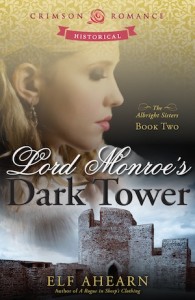Today we welcome guest blogger Elf Ahearn, here to talk about her new book, the second in the Albright Sisters Series. Currently at work on the third book, The Duke’s Brother, Elf (and yes, that really is her name) is giving away a download of A Rogue in Sheep’s Clothing (Book I) and Lord Monroe’s Dark Tower (Book II).
 Two years of bewildering silence have passed since Claire Albright’s passions were first inflamed by the powerful, brooding, Lord Flavian Monroe. On the brink of her debut in London he suddenly summons her, asking that she use her knowledge of healing to help his ward—a girl who hoards castoffs in memory of her dead brother. Embroiled in a desperate attempt to curb the child’s destructive madness, Claire struggles to understand Flavian’s burning kisses yet cold demeanor. Can she reach his heart before his ward’s insanity undoes Claire’s chance at love?
Two years of bewildering silence have passed since Claire Albright’s passions were first inflamed by the powerful, brooding, Lord Flavian Monroe. On the brink of her debut in London he suddenly summons her, asking that she use her knowledge of healing to help his ward—a girl who hoards castoffs in memory of her dead brother. Embroiled in a desperate attempt to curb the child’s destructive madness, Claire struggles to understand Flavian’s burning kisses yet cold demeanor. Can she reach his heart before his ward’s insanity undoes Claire’s chance at love?
When he was fourteen, Flavian made a mistake so devastating it ruined all hope for happiness. Years later, he’s still paying for his sin. But before his ward’s troubled mind destroys his home and family, he must see Claire once more. Vowing to keep their relationship professional—she the healer, he the guardian—he finds the bonds of his resolve snapping. Somehow, he must content himself with the love that could have been . . . but he cannot resist . . . one final embrace . . .
 And now in Elf’s words, her inspiration for the book:
And now in Elf’s words, her inspiration for the book:
I find it exceptionally appropriate to introduce my latest novel, Lord Monroe’s Dark Tower, on a blog titled “Risky Regencies,” for its plot is risky indeed.
Naturally, the love story is front and center, but in this book I don’t limit my villain to occasional appearances – she is the hero’s ward – and therefore mingles and interrupts and winds herself around the budding couple’s every action.
My villainess, Abella, is very loosely based on my sister who became a hoarder following the death of my father. My sister is a brilliant, creative woman who ran her own theatre company, which my father supported in every way you can imagine. When he died, I think the floor dropped out beneath her and she just couldn’t cope.
He was a collector of books, maps and Asian antiquities, and our house, which was quite large, was jammed with his stuff. The moment any one of us left for college, he turned our bedroom into a library. By the time he died, we had more than 27,000 volumes in the house—about what a small local library might carry.
My mother invited booksellers from across the country to buy the collection. She emptied the majority of the shelves, but during my father’s last years, he’d taken to purchasing just about anything with pages and a binder. These were the books my sister felt obligated to protect.
In front of her small home by a running stream, under thick pines, my sister stacked about fifty boxes of books then covered them with a black tarp. This makeshift shed was so large the front door couldn’t be seen. The only way to access her house was through a narrow trail banked by teetering boxes. Then she filled the inside of her house with more boxes—boxes of old travel pamphlets, sheafs of the same theatrical flyer and resume shots of actors she’d never auditioned. When she ran out of floor space, she hung possessions from the ceiling.
A nearby theatre company threw out its sets. She brought them all home and built more tarp-covered sheds. Unscrupulous neighbors dumped garbage on her property. The moisture from the stream, trapped by the pine trees, and nurtured in the dense atmosphere in her house caused an outbreak of mold.
Sick from the foul air, my sister could no longer work. With no money she took to “shopping” at the local landfill. More sheds sprouted on her property, more belongings were crammed into her tiny space.
From this wreckage, she planned to start another theatre company. How would she use this string of Halloween lights with some of the owls cracked off? She’d found the other owls—she’d glue the string back together—put on a new plug. It was valuable. We couldn’t throw it out.
Finally, she was diagnosed with a lupus-like disease, and my mother lured her down to Florida for the winter. During their absence, another family member and I cleaned the place up. When she returned, her outrage was absolute. She still suffers from the sting of our betrayal—after all, we took everything of value from her.
What I try to portray in Abella’s character is the strange, impenetrable logic used by people who hoard, but I want to make it clear, her personality is nothing like my sister’s. Abella is a psychopath. My sister is a sweet lady who suffered a mental collapse, but has since gotten herself together, and now leads a successful life.
They say, “Write about what you know.” My hope is that readers will enjoy delving into the mind of someone who hoards, and that the action-packed adventure and steamy love story, will keep them turning the pages.
Hoarding has become increasingly prevalent. I’d like to ask if anyone knows someone who hoards; if they find themselves tending to pack the corners of their own households; or if they dig watching the TV show, Hoarders, which frankly, I find mesmerizing. There’s a free download of both A Rogue in Sheep’s Clothing AND Lord Monroe’s Dark Tower, for the best, most truthful answer.
